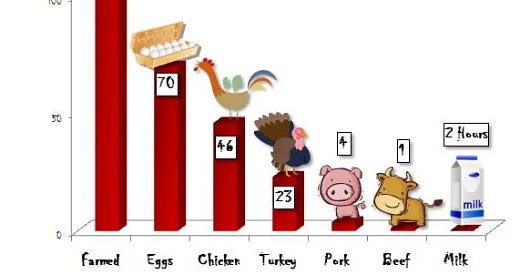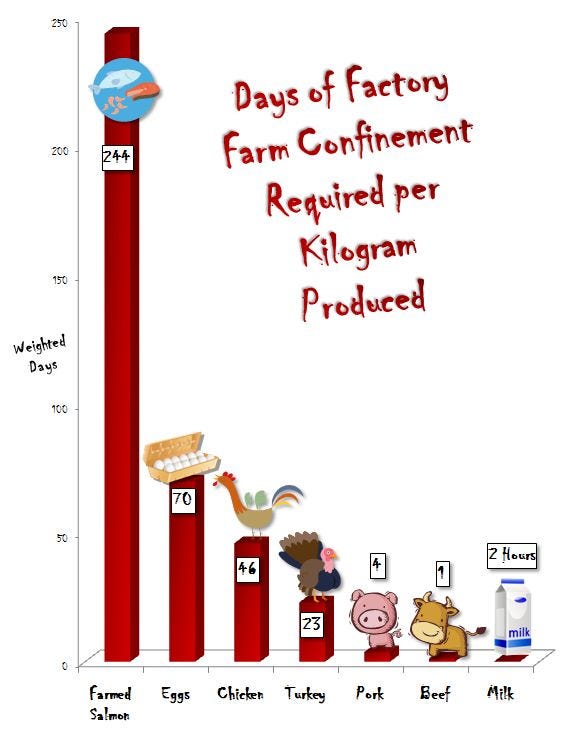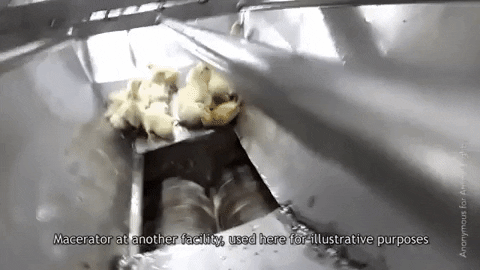Ethical Vegetarianism Makes No Sense
If you don't eat flesh, you shouldn't eat dairy and eggs
For the first many years of my life I kept sort of Kosher (I didn’t eat the kinds of foods that weren’t kosher, but I didn’t make sure everything was kosher certified). This was for a fairly simple reason: my immediate family was Kosher, and I wasn’t the one doing the grocery shopping or paying for food. At one point, when I went to Las Vegas (to play in a Magic the Gathering tournament—I was really cool in middle school (I made day two, in case you were wondering, ending 9-6)) my grandmother permitted me to order clams, which I was quite curious to try.
The next day, at the hotel, there was bacon. In a feat of grand cosmic injustice, my grandmother prohibited me from eating bacon on the grounds it was not kosher. “Why,” I asked, “was I permitted to eat clams yesterday.” My grandmother explained that those were different; clams were, in her estimation, basically like fish, so ordering them was okay.
This was quite bizarre logic. Rabbi Yoav Ben’Simchakson wouldn’t have bought it. The writers of the Talmud would have wagged their fingers disapprovingly. Even reform Jews generally wouldn’t have bought it. Clams are just as non-kosher as bacon. So it seemed to me that it makes no sense to distinguish them.
This is how I feel about vegetarians.
I can understand being a vegan. It would be pretty weird if I didn’t understand it, as I am a vegan, and have written over and over again about why it’s morally required. The argument for veganism is straightforward: you shouldn’t cause animals extreme suffering for the sake of comparatively minor pleasures. You shouldn’t cause animals to suffer for days on end in miserable conditions, in filth, feces, and ammonia, with no space to turn around, never able to experience joy or see the sun, before being sent to slaughter, so that you can enjoy a burger.
But this applies to dairy and eggs as much as meat. Heck, it applies to eggs way more than it applies to meat. If one looks at a chart of the amount of suffering caused by different animal produces, it looks roughly like this (the 7th column has the amounts, the others have the numbers that go into the amounts):
This image also is a good estimate, using slightly different numbers:
Chickens don’t make very many eggs in their lifetime. While it takes a while to eat a cow’s worth of beef, it doesn’t take as long to eat a lifetime supply worth of eggs. And the conditions that chickens undergo in the egg industry are almost certainly the worst of any of the major animal industries.
Chickens spend their lives in crates, too small to turn around or stretch, about the size of a sheet of paper. Take a moment to imagine what this would be like, what it would be if you spent all your life in a sharp metal cage, meaning you’re never comfortable, your skin constantly rubs against hard wire meshing, and you can never move or turn around. It looks like this:
Egg-laying hens are debeaked. That means a knife is dragged across their beaks to cut them. Chickens’ beaks are sensitive and filled with nerve endings. It probably feels roughly like it would feel if someone cut off your nose with a knife.
Hens, having no ability to play or do anything productive, develop frail bones and vitamin deficiency. About 89% of them have osteoporosis. About 1 in 6 hens have broken bones at any given time.
How do they die? In many ways. Many die from the stress and rampant disease of daily life. Others die from the process of forced molting—where hens are systematically starved, because it tricks their body into laying more eggs. At any given moment, millions of chickens are starved as part of the forced molting process for days on end—a process that kills 5-10% of chickens.
Others die from slaughter. When the hens are done laying eggs, they’re shipped to slaughter. They’re killed by hoisted by one leg, which often breaks it, then they’re supposed to be stunned, and then they’re beheaded. Of course, the stunning often fails, meaning they’re fully conscious when their throat is cut, or worse, when they’re deposited into boiling water.
Others die from the barn fires that kill hundreds of thousands of chickens annually. Hens are regarded as an expendable byproduct, so unsafe conditions that cause hundreds of thousands of birds to burn to death are seen as perfectly fine.
The males, of course, die shortly after birth. Male chicks can’t lay eggs, and they’re not the right kind of chicken to be sold for meat, so they’re killed. They’re either crushed or suffocated in bags, or ground up in a macerator. This is what it looks like when they’re ground up in a macerator:
(If you find it upsetting to look at, maybe you shouldn’t pay for beings to endure it.)
Satan himself couldn’t dream up a crueler industry. The egg industry genuinely resembles something out of a horror movie. And yet vegetarians stuff their faces with enormous numbers of eggs, all the while thinking their diet is justified by considerations of animal welfare. They cause many extra chickens to endure this cruel fate, where the male babies are ground up, and the females are trapped in cages for their entire lives and then killed.
Eggs are among the worst of the animal products. Because chickens make so few eggs, each time you consume just a single egg, you consign a chicken to roughly an extra day of torture (and yes, it is torture, just as yourself what you’d call it if someone was doing these things to dogs).
I can understand continuing to eat dairy if you’re not going to eliminate your meat consumption. Because cows make so much milk, it’s the least bad animal product to eat. Of course, it’s still bad—cows are held down and repeatedly forcefully injected with bull semen to get them pregnant, before their babies are stolen from them, sold for beef or veal, and then they’re forcefully impregnated again. After they’re out of milk, they’re slaughtered for meat.
But vegetarians generally eat dairy and eggs. This would be like if a person wanted to reduce their carbon footprint, so they got rid of the things they do that hurt the environment except for eating with plastic straws and flying on planes. Eating with plastic straws makes sense—it’s less bad for the environment than other things—but you shouldn’t keep flying on planes. If you’re going to reduce your environmental footprint, you should start with reducing flight times. If you’re going to reduce the harm you cause animals, you should start with eliminating egg consumption.
The tortured animals in factory farms don’t care whether you eat their corpse or their secretions. In both cases, there’s the same contribution towards their excess suffering. Vegetarians draw arbitrary and senseless distinctions. If one is going to eat animal products, they should eat beef or pork long before they even consider eating eggs.








Once again, this is a great argument against factory farms, not against vegetarianism (nor meat eating). Where I live chickens are not caged: it’s illegal. Factory farming practices should be abolished: we should ensure that domesticated animals do not suffer excessively. And between advocating veganism and advocating reducing animal suffering by changing farm legislation, I think that latter is much more likely to pay off in substantially reduced animal suffering. So you should change the focus of these essays, or else at least advocate farm legislation reform as a supplement to vegan advocacy.
From a deontological perspective, it makes sense to be more unwilling to pay for a product that requires murder than a product that does not. That’s the consideration that got me to stop eating meat.
I get what you mean, though. I’ll avoid eggs.